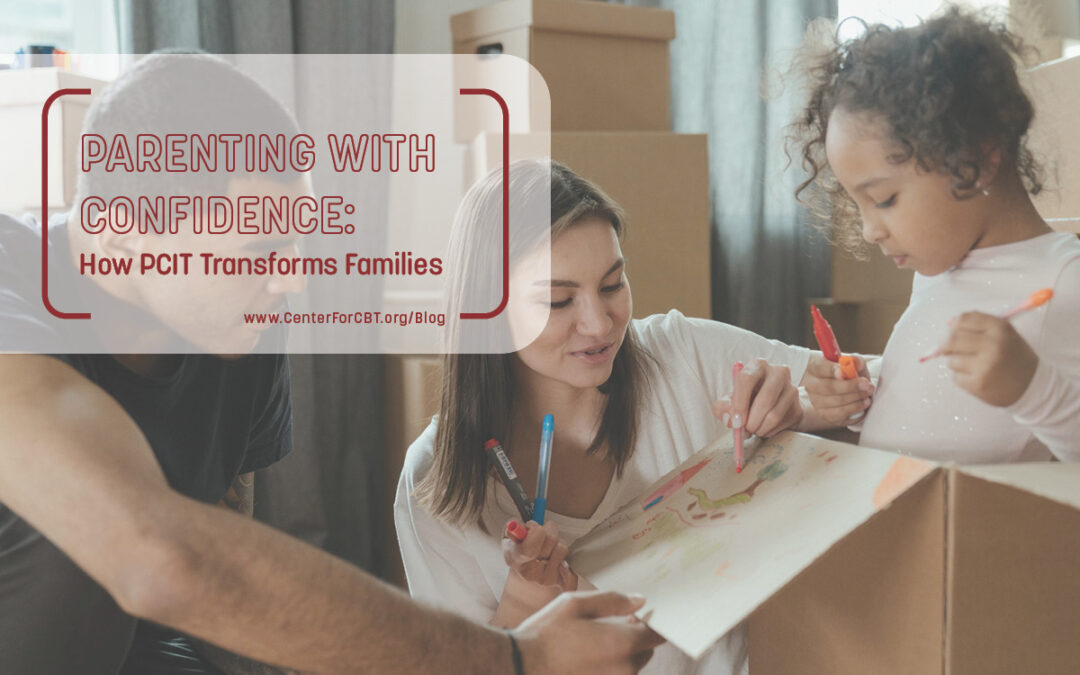Parenting is a journey filled with joy, challenges, and moments of self-doubt. Many parents, at some point, feel overwhelmed, unsure of their abilities, or burnt out from navigating their child’s behavioral struggles. It’s not uncommon for parents to voice concerns like, “I don’t enjoy playing with my child anymore,” or, “I feel like I’m constantly frustrated.” These feelings, though difficult, are valid and shared by many families who turn to Parent-Child Interaction Therapy (PCIT) for support.
PCIT is an evidence-based therapeutic approach that helps parents rebuild their confidence and strengthen their bond with their child. By emphasizing positive reinforcement, clear communication, and consistent discipline, PCIT transforms parent-child interactions into opportunities for growth, connection, and lasting change.
Understanding the PCIT Approach
Developed in the 1970s by Dr. Sheila Eyberg, PCIT combines principles of play therapy, behavioral psychology, and parent training. Its structured framework focuses on improving the parent-child relationship while addressing challenging behaviors in children aged 2.5 to 7 years. Parents often arrive at PCIT feeling stuck in cycles of frustration and negativity. Through the therapy’s two phases— Child-Directed Interaction (CDI) and Parent-Directed Interaction (PDI)— they learn skills to break those cycles and create a nurturing, supportive environment.
The first phase of PCIT, CDI, prioritizes repairing and enhancing the parent-child bond. Many families enter therapy with strained relationships caused by frequent conflicts and miscommunication. CDI provides parents with tools to foster positive interactions, build trust, and reinforce their child’s self-esteem. These strategies shift the dynamic from criticism or correction to validation and warmth, fostering a sense of security and belonging in children. PCIT teaches these strategies using the PRIDE skill:
- Praise. Make specific praises about your child’s good behavior:
- “You did a great job sharing that toy”
- Reflect. Reflect back what your child says to show you’re listening and engaged:
- Child says, “I built a tower” and parent reflects, “You built a tower!”
- Imitate. Follow along in your child’s play:
- Child and parent both color together
- Describe. Act like a sportscaster and describe your child’s play actions to show you are paying attention and approve of how they are playing:
- “You’re throwing the ball! You threw it so far!”
- Enjoy! Tell your child how much you enjoy spending time with them:
- “I’m having a great time playing with you”
In the second phase, PDI, parents learn effective strategies for managing misbehavior calmly and confidently. This phase emphasizes clear communication, consistent consequences, and structured discipline techniques. Parents practice delivering simple, effective commands and following through with appropriate consequences when needed. PDI helps children understand boundaries while reinforcing that their parents’ love and approval remain constant. Parents often feel more in control and less reactive as they master techniques that work in real time, reducing their stress and improving family dynamics.
Why Does PCIT Work?

Another unique aspect of PCIT is its data-driven approach. Therapists track progress during each session, measuring parents’ skill development and improvements in their child’s behavior. This structured framework ensures families achieve meaningful results and know when they are ready to graduate from therapy. Most families complete PCIT within 12 to 20 sessions, making it a time-limited yet highly effective intervention.
Who Can Benefit from PCIT?
PCIT is designed for families facing behavioral challenges, regardless of whether their child has a formal diagnosis. Children with Attention-Deficit/Hyperactivity Disorder (ADHD), Oppositional Defiant Disorder (ODD), or Autism Spectrum Disorder (ASD) often benefit from PCIT, but the therapy can be effective for children without a diagnosis. Any family struggling with defiance, tantrums, or general frustration can gain valuable tools from PCIT.
PCIT is particularly effective for parents who feel they have tried other methods without success. Parents may fall into habits that are either too strict or too permissive in terms of setting boundaries and delivering consequences. PCIT offers a balanced approach to find solutions that target challenging family dynamics. Families often report that the skills they learn not only improve their targeted child’s behavior but also positively impact their relationships with other children in the household.
The Ripple Effect of PCIT
One of the most remarkable aspects of PCIT is its ability to transform the entire family dynamic. Parents frequently find that the techniques they learn— such as offering specific praise, staying calm during difficult moments, and delivering consistent consequences— benefit all their children, not just the one receiving therapy. Siblings often respond positively to the improved atmosphere, resulting in a more harmonious and supportive home environment.
For example, a parent might begin practicing skills like narrating positive behaviors or delivering effective commands with one child and notice their other children responding in similar ways. These techniques gradually become second nature, reshaping the way the family communicates and interacts. Parents also report feeling more confident and less overwhelmed. By learning to set boundaries and manage behaviors effectively, they regain a sense of control and calm in their parenting journey. This shift reduces stress and creates a healthier environment for everyone involved.
Common Concerns Parents Raise about PCIT
Despite its proven effectiveness, parents often have questions or concerns about starting PCIT. A common worry is whether PCIT will work for their specific situation. The good news is that PCIT is highly adaptable and effective across diverse family structures, cultural backgrounds, and behavioral challenges. Whether dealing with tantrums, defiance, or general frustration, PCIT provides tools to navigate these difficulties.
Another concern parents express is how to apply the techniques if they have multiple children needing support. The principles of PCIT are not limited to a single child. Many parents find that as they implement PCIT techniques, such as offering specific praise and setting consistent boundaries, all their children benefit. The therapy’s flexibility allows it to address the unique needs of each child while fostering a cohesive family environment.
Time is another common concern. Parents may worry that therapy will take too long or require an indefinite commitment. However, PCIT is a structured, time-limited intervention. Families typically complete therapy within a few months, and progress is closely monitored using data. This ensures that families achieve measurable results and know when they are ready to complete treatment.
Long-Term Benefits of PCIT
The benefits of PCIT extend far beyond the therapy sessions. Parents often find that the skills they develop, such as effective communication, consistent discipline, and positive reinforcement, serve them well throughout their child’s development. These foundational tools can be adapted as children grow, helping families navigate new challenges with confidence.
The improved parent-child bond created during PCIT has lasting emotional benefits. Children who feel secure and supported are more likely to develop healthy self-esteem, emotional regulation, and social skills. For parents, reconnecting with their child and rebuilding their confidence creates a stronger sense of fulfillment and joy in their role. Families who complete PCIT often describe feeling more connected, less stressed, and better equipped to handle future challenges.
Getting Started with PCIT
Parenting is undoubtedly one of life’s most rewarding yet challenging roles. While every child is unique and there is no one-size-fits-all manual, PCIT offers a proven, research-backed approach to navigating the ups and downs of raising young children. By fostering positive interactions, teaching effective discipline techniques, and providing real-time support, PCIT empowers parents to build stronger, healthier relationships with their children.
If you feel overwhelmed or unsure about how to manage your child’s behavior, help is available. Contact Center for CBT to learn more about how PCIT can support your family’s journey toward a brighter, more confident future. Together, we can help you build a stronger, healthier relationship with your child.




